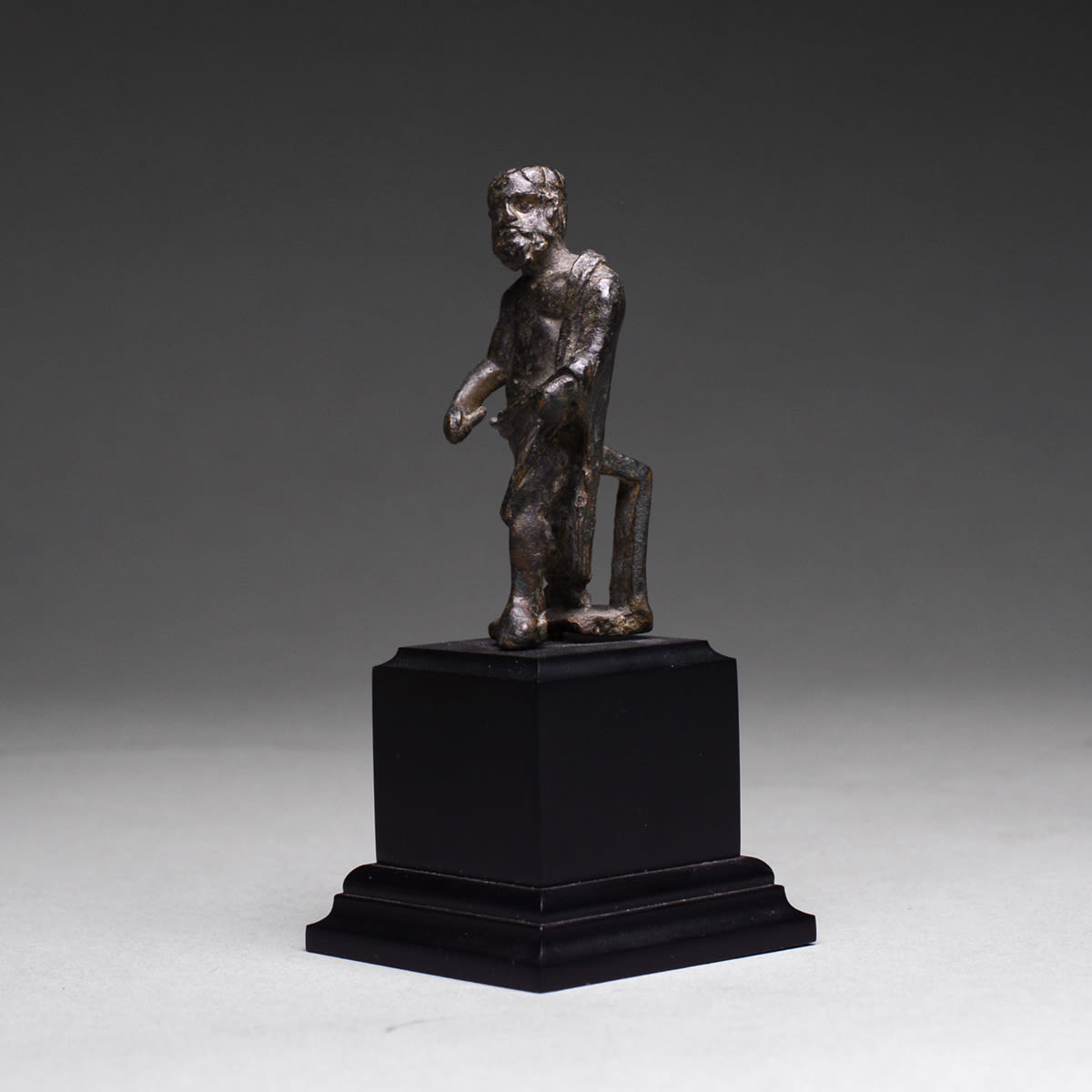Roman Bronze Sculpture of a Philosopher, 200 CE - 300 CE
Bronze
6.7 x 2.5 cm
2 5/8 x 1 in
2 5/8 x 1 in
FZ.354
Further images
The Classical world offered inspiration and advancement to every fact of civilization imaginable. But what are their artists, their sculptors, their poets, their soldiers, and their kings when compared to...
The Classical world offered inspiration and advancement to every fact of civilization imaginable. But what are their artists, their sculptors, their poets, their soldiers, and their kings when compared to their philosophers? Anywhere and any time one turns to in history they find the quiet struggle for artistic beauty and the louder clash of sword and shield. One may occasionally, though rarely, encounter the cacophony of grinding metal and hissing gas that accompanies the pursuit of mechanical and scientific endeavor. Almost never does one hear the true and pure silence of thought, the most delicate word of debate. Our Classical ancestors are so striking, in part, because they wrestled with the massive and intricate concepts that human beings have structured their entire societies and existences around. They dissected and then rebuilt the very framework of our world. From their lips and their pens sprang the university and the temple, the voting tablet, and the diadem. They fit the most dazzling marble sculptures and highest mountain peaks into the palm of their hand.
Looking into the benign and intelligent face of the Roman philosopher depicted in this sculpture, it is easy to understand why the love of learning was so important to the ancients and is so significant to us today. His eye is alive with the pleasure of understanding- his hollow cheeks are tense with the ambition and vigorous energy of one constantly on the brink of epiphany. His beard, so bold and regal, speaks of a life well-lived but his body, with the gentle curve of his belly and boyish firm of his pectorals- has a few decades stored in it at the very least. He grasps a scroll in his hand, perhaps to be given to a colleague for review or to be read from at a lecture. His chiton is tossed open quite carelessly- but if your mind was constantly occupied with the very heartstrings of the universe, might you too not forget the cautious vanity of decorum? We philosophers of the silicone world are no longer enshrined and adored in any manner, let alone in the exquisite immortalization that this lucky thinker was graced with. In fact, it is hard for us to find anyone else at all who wonders why art is beautiful, how cities are built, and just what we should do in the brief near-century we have here on earth. To stare into the eyes of this philosopher is to feel a warm hand on our back, reaching out of the sand of two thousand years, reminding us that we are not alone. Reminding us that the awe and pleasure we experience in our pursuit of the answer is part of the answer itself. In our broken world, it is vital for us to channel the strength of this philosopher; to use his energy, and with it the intellect of all man-kind, to bring our lives and the lives around us back into the gentle light of Philosophy.
Looking into the benign and intelligent face of the Roman philosopher depicted in this sculpture, it is easy to understand why the love of learning was so important to the ancients and is so significant to us today. His eye is alive with the pleasure of understanding- his hollow cheeks are tense with the ambition and vigorous energy of one constantly on the brink of epiphany. His beard, so bold and regal, speaks of a life well-lived but his body, with the gentle curve of his belly and boyish firm of his pectorals- has a few decades stored in it at the very least. He grasps a scroll in his hand, perhaps to be given to a colleague for review or to be read from at a lecture. His chiton is tossed open quite carelessly- but if your mind was constantly occupied with the very heartstrings of the universe, might you too not forget the cautious vanity of decorum? We philosophers of the silicone world are no longer enshrined and adored in any manner, let alone in the exquisite immortalization that this lucky thinker was graced with. In fact, it is hard for us to find anyone else at all who wonders why art is beautiful, how cities are built, and just what we should do in the brief near-century we have here on earth. To stare into the eyes of this philosopher is to feel a warm hand on our back, reaching out of the sand of two thousand years, reminding us that we are not alone. Reminding us that the awe and pleasure we experience in our pursuit of the answer is part of the answer itself. In our broken world, it is vital for us to channel the strength of this philosopher; to use his energy, and with it the intellect of all man-kind, to bring our lives and the lives around us back into the gentle light of Philosophy.









